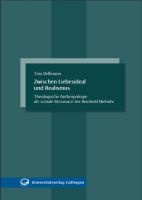Zwischen Liebesideal und Realismus - Theologische Anthropologie als soziale Ressource bei Reinhold Niebuhr
Author(s)
Bellmann, Tina,
Collection
AG UniversitätsverlageLanguage
GermanAbstract
What is there left to say about the human condition after the so-called „end of anthropology“? Never before have conceptions of what it means to be a human being been as diverse and fragmented as in the late modern age – with severe consequences for democratic discourse and liberal, „Western“ societies as a whole. Examining the work of American theologian Reinhold Niebuhr (1892–1971), the book presents new insights into the intersection of anthropological thought and ethical orientation. Niebuhr, motivated by his perception of profound political and social crises in „Western“ societies, develops an innovative, pragmatic and „realistic“ type of theological anthropology. His anthropological approach functions as the basis of a much larger endeavor: rescuing Christianity and democracy itself. Reading Niebuhr today opens up a refreshing perspective on current debates on public theology and the so-called „crisis of democracy“. In this context, the book argues, theological anthropology can be reclaimed as an essential social resource: It offers a comprehensive understanding of human nature both at its best and at its worst, providing the indispensable basis for the survival and vitality of democracy. Was lässt sich nach dem vielbeschworenen „Ende der Anthropologie“ noch vom Menschsein sagen? Wie lässt sich angesichts der zunehmenden anthropologischen Sprachlosigkeit noch ethische Orientierung gewinnen? Welche Folgen hat die Fragmentierung von Menschenbildern für den demokratischen Diskurs? Dieses Problemfeld bearbeitet die Autorin unter Rückgriff auf das Denken des hierzulande wenig bekannten US-amerikanischen Theologen Reinhold Niebuhr (1892–1971). Auf breiter Quellenbasis werden Genese, Funktion und Profil seiner theologischen Anthropologie herausgearbeitet, die sich als pragmatisch orientiertes, zentral um die Sündenlehre kreisendes Denkmodell präsentiert. Die Wahrnehmung tiefgreifender politischer und sozialer Krisen regt Niebuhr dazu an, die Anthropologie zum Fundament eines großangelegten gesellschaftlichen Rettungsprogramms auszubauen. Aus der einsichtsvollen historischen wie theologischen Aufarbeitung des Niebuhrschen Werkes leitet die Autorin gewichtige Impulse für die Debatten der Gegenwart ab. Sie zeigt auf, wie eine „realistische“ Anthropologie im Sinne Niebuhrs nicht nur einen innovativen Ansatz einer public theology begründet, sondern darüber hinaus als „soziale Ressource“ in der Debatte um die „Krise der Demokratie“ neue Wege aufzuzeigen vermag.
Keywords
theologic anthropology; Reinhold Niebuhr; realism; Bürgerliche Gesellschaft; Dialektik; Georg Wilhelm Friedrich Hegel; Immanuel Kant; Kapitalismus; Objektivität; Subjekt (Grammatik); Subjekt (Philosophie); Theodor W. Adorno; WareDOI
10.17875/gup2018-1095ISBN
9783863953201OCN
1083023490Publisher
Universitätsverlag GöttingenPublication date and place
2018Classification
Anthropology


 Download
Download Web Shop
Web Shop